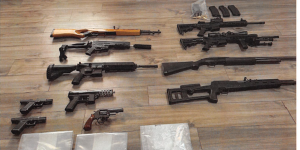Press Release
Large-Scale Counterfeit Fentanyl Pill Dealer Convicted At Trial
For Immediate Release
U.S. Attorney's Office, Middle District of Florida
Tampa, FL – United States Attorney Maria Chapa Lopez announces that a federal jury has found Dion Gregory Fisher (33, formerly of Seminole) guilty of conspiring to manufacture and distribute fentanyl and fentanyl analogue, and money laundering. Because Fisher was convicted of distributing more than 400 grams of fentanyl and more than 100 grams of fentanyl analogue, he faces a mandatory minimum sentence of 10 years, up to life, in federal prison. In addition to the conspiracy count, the jury found Fisher guilty of five counts of fentanyl distribution and manufacturing and eight counts of committing money laundering transactions involving more than $10,000 of narcotics proceeds. A preliminary order of forfeiture was entered for several high-end vehicles, real property, and jewelry that Fisher had purchased with fentanyl proceeds, as well as for cash proceeds. A sentencing date has not yet been set.
According to the testimony and evidence presented at trial, Fisher and others, including Christopher McKinney, manufactured and distributed hundreds of thousands of counterfeit oxycodone 30 mg blue and white pills that were made with fentanyl, that Fisher had ordered from China. Fisher ordered pill presses from China, some of which were seized by Homeland Security. He also purchased binding and cutting agents used during the pill-manufacturing process. Fisher and McKinney distributed thousands of fentanyl pills to Phil Morose, formerly of Boston, in person when Morose traveled to Tampa, and later by U.S. mail to various addresses in Boston.
Fisher was charged with his co-defendant, Sam Huffman, who had used the pill presses and materials provided by Fisher to press fentanyl pills at his automotive business in Pinellas Park. Fisher also stored fentanyl and fentanyl analogue in a work bay in Clearwater. In January and February 2018, large quantities of fentanyl and fentanyl analogue were seized from both locations, as well as from Fisher’s residence in Seminole, and McKinney’s residence and work bay. More than three kilograms of fentanyl and fentanyl analogue were admitted into evidence during the seven-day trial.
Fisher laundered the proceeds from his fentanyl pill sales with Konrad Guzewicz, who owned and operated automotive and tire-and-rim companies in Pinellas County. Fisher purchased several high-end luxury vehicles, including an Aston Martin, a Bentley, a Maserati, a BMW, and an Audi R8, with fentanyl proceeds. Guzewicz also laundered fentanyl cash proceeds for Fisher. On four occasions, Fisher provided Guzewicz with $35,000 in cash he had obtained from selling fentanyl pills, and Guzewicz in turn wrote Fisher a $30,000 check from his business and personal accounts.
On June 28, 2018, Guzewicz pleaded guilty to four counts of money laundering. He faces up to 10 years in federal prison for each count. His sentencing hearing is scheduled for July 2, 2019.
On July 2, 2018, McKinney pleaded guilty to conspiring to distribute and manufacture more than 4000 grams of fentanyl and more than 100 grams of fentanyl analogue. He faces a mandatory minimum penalty of 10 years, up to life, in federal prison. His sentencing hearing is scheduled for June 28, 2019.
On October 9, 2018, Huffman pleaded guilty to the fentanyl conspiracy and is scheduled to be sentenced on June 24, 2019. He faces a mandatory minimum penalty of 10 years, up to life, in federal prison.
On January 26, 2019, Morose pleaded guilty to conspiring to distribute and manufacture more than 4,000 grams of fentanyl and more than 100 grams of fentanyl analogue. He faces a mandatory minimum penalty of 10 years, up to life, in federal prison. His sentencing hearing is scheduled for July 8, 2019. In a related case, Morose has been indicted on one count of money laundering in Boston.
This case was investigated by the Middle District of Florida Opioid Fraud and Abuse Detection Unit – one of 12 Department of Justice pilot programs created to help combat the devastating opioid crisis that is ravaging families and communities across America and to prosecute individuals that are contributing to the opioid epidemic. It was investigated by the Drug Enforcement Administration, the Pinellas County Sheriff’s Office, the Pinellas Park Police Department, the Tarpon Springs Police Department, the United States Postal Inspection Service, the U.S. Marshals Service, and IRS – Criminal Investigation. It is being prosecuted by Assistant United States Attorneys Kelley Howard-Allen, Maria Guzman, and Greg Pizzo.
Updated June 19, 2019
Topic
Opioids
Component

 U.S. Department
of Justice
U.S. Department
of Justice
